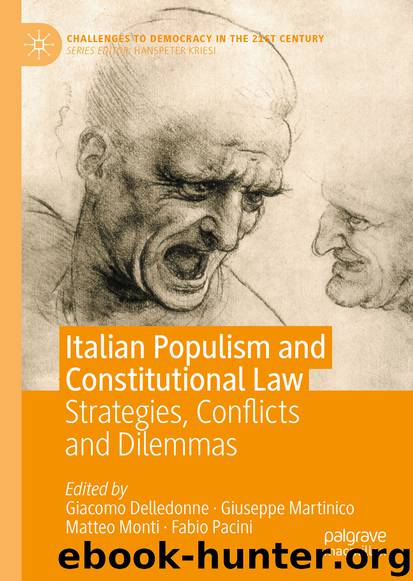Italian Populism and Constitutional Law by Giacomo Delledonne & Giuseppe Martinico & Matteo Monti & Fabio Pacini

Author:Giacomo Delledonne & Giuseppe Martinico & Matteo Monti & Fabio Pacini
Language: eng
Format: epub
ISBN: 9783030374013
Publisher: Springer International Publishing
The Deep Roots of a Bipartisan Populist Approach in the Italian Budgeting Process
Manifestations of populist constitutionalism do not come out of the blue, but are a tangible sign of a deep popular distrust towards certain institutions of liberal democracy or sometimes even of a precarious societal embedment thereof. Fiscal discipline in Italy is an example of this kind, since it was never well rooted in the social Constitution of the country. During the constitutional history of the Italian Republic, legal constraints on the budget have been strained and misinterpreted, while judicial review of legislation for a long time barely played a role in implementing them. Besides, the entrenchment of budget constraints is, still nowadays, all but accepted in the academic legal community, since some authors consider them to call into question the neutrality of the Constitution vis-à-vis different economic thoughts and, in particular, lean it towards a modern form of authoritarian constitutionalism (see inter alia Alvar Garcia 2019: 37–56).
As the Italian Constituent Assembly enshrined Article 81 into the text of the new Constitution in 1946–1947, the primary concern of the Founding Fathers and among them, especially, of the future Finance and Budget Minister, Ezio Vanoni and the future second President of the Republic, the economist Luigi Einaudi, was to restrict the parliamentary spending initiative, since an expanded role of the legislature, that is, its capacity to amend budget decisions, appeared as a potential source of deficit finance (Santagostino 2017: 44–48; Einaudi 1956: 205). What the Founding Fathers had before their eyes, in fact, was the early twentieth-century degeneration of parliamentary powers, when political majorities were prompted to loosen the public purse strings in order to meet the multifarious interests of their constituencies. In their view, therefore, an effective constitutional provision should have prevented the Parliament from amending the executive’s budget proposals (Gianniti 2011). On the contrary, once the executive had submitted the draft budget, the Parliament should have been vested with the power to hold it accountable by examining the bill and ultimately approving or rejecting it. Yet, the power of amendment by members of Parliament was eventually preserved, but severely restricted by the final text of Article 81 (4) IC, which stipulated that “any […] law involving new or increased expenditures shall detail the means therefor”. The original idea behind this clause was to hamper Parliament in its attempt to increase public spending, at the same time by embedding a strict balanced budget rule. However, those MPs who believed that in a multiparty system the Parliament should have been entrusted with the power to fully expose citizens’ needs—while the government should have been in charge of providing the corresponding financial resources—did not share this final institutional settlement (cf. Mostacci 2016: 178–183). Therefore, one can claim that Article 81 was born on shaky premises, thus being an ideal breeding ground for its opportunistic interpretation (see also: Delledonne 2014: 188–189; Tanzi 2018: 269).
In fact, the idea of a strict balanced budget rule was gradually discarded and superseded during the 1960s by
Download
This site does not store any files on its server. We only index and link to content provided by other sites. Please contact the content providers to delete copyright contents if any and email us, we'll remove relevant links or contents immediately.
| Africa | Americas |
| Arctic & Antarctica | Asia |
| Australia & Oceania | Europe |
| Middle East | Russia |
| United States | World |
| Ancient Civilizations | Military |
| Historical Study & Educational Resources |
Room 212 by Kate Stewart(5105)
The Crown by Robert Lacey(4807)
Endurance: Shackleton's Incredible Voyage by Alfred Lansing(4769)
The Iron Duke by The Iron Duke(4349)
The Rape of Nanking by Iris Chang(4203)
Joan of Arc by Mary Gordon(4101)
Killing England by Bill O'Reilly(3996)
Say Nothing by Patrick Radden Keefe(3975)
I'll Give You the Sun by Jandy Nelson(3429)
Shadow of Night by Deborah Harkness(3361)
Hitler's Monsters by Eric Kurlander(3329)
Mary, Queen of Scots, and the Murder of Lord Darnley by Alison Weir(3208)
Blood and Sand by Alex Von Tunzelmann(3195)
Eleanor & Park by Rainbow Rowell(3153)
Darkest Hour by Anthony McCarten(3119)
Margaret Thatcher: The Autobiography by Thatcher Margaret(3080)
Book of Life by Deborah Harkness(2932)
Red Famine: Stalin's War on Ukraine by Anne Applebaum(2929)
The One Memory of Flora Banks by Emily Barr(2857)
